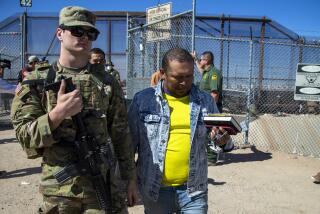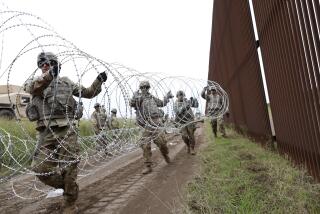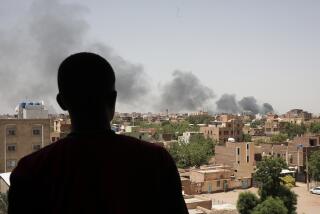Obama thanks soldiers at Ft. Drum for Afghanistan efforts
- Share via
President Obama on Thursday thanked soldiers in upstate New York for their work in combat and said their efforts had helped the United States to turn the corner in Afghanistan and allow some troops to be brought home.
“You guys have sacrificed mightily,” Obama said in Ft. Drum, the home of the Army’s 10th Mountain Division, which has often been deployed to Iraq and Afghanistan and will probably see more fighting in the coming years.
“For all the sacrifices that you’ve made, I want to say thank you. For all the sacrifices that your families have made, I want to say thank you,” Obama said. “To all of you who are potentially going to be redeployed, just know that your commander in chief has your back.”
Obama traveled to Ft. Drum as other members of his administration began the difficult process of selling the president’s policy to a skeptical Congress and American electorate. Obama outlined his policy in a speech from the White House on Wednesday night.
Obama said he would order 5,000 troops home next month and 5,000 more to leave Afghanistan by the end of the year. About 23,000 troops would come home in 2012, leaving about 68,000 U.S. troops in Afghanistan to continue fighting the Taliban and help the Afghan government build its security forces.
Top officials, including Secretary of State Hillary Rodham Clinton, praised the president’s plan, which has drawn mixed reviews from both sides of the congressional aisle.
“We have broken the Taliban’s momentum,” Clinton testified Thursday before the Senate Foreign Relations Committee. “We do begin this drawdown from a position of strength.”
But military officials were less enthusiastic, though they insisted that they supported Obama’s plan.
Speaking at a Senate hearing, Gen. David H. Petraeus, the top U.S. commander in Afghanistan, said he had recommended a slower withdrawal, but agreed with the president’s timetable.
“The ultimate decision was a more aggressive formulation, if you will, in terms of the timeline than what we had recommended,” Petraeus said at his confirmation hearing to become the head of the CIA.
The chairman of the Joint Chiefs of Staff, Adm. Michael G. Mullen, sounded a similar note in an appearance before the House Armed Services Committee.
“The president’s decisions are more aggressive and incur more risk than I was originally prepared to accept,” Mullen said, adding that keeping more troops in Afghanistan longer would have been safer. He also insisted that he supported the president’s action.
During his appearance at Ft. Drum, Obama repeatedly praised the soldiers and their work, which he said allowed him to bring some troops home.
“You guys have always been there in the toughest fights. And the fact that you are continuing, even as we speak, that many of your comrades are there right now under some very tough circumstances, is a testimony to your dedication and your patriotism.
“Because of what you’ve done, areas like Kandahar are more secure than they have been in years,” the president said. “Because of you, we’re now taking the fight to the Taliban instead of the Taliban bringing the fight to us.
“And because of you, there are signs that the Taliban may be interested in figuring out a political settlement, which ultimately is going to be critical for consolidating that country,” Obama said.
But Obama warned that the job was not yet over and that troops can expect to return to the fighting. Under Obama’s plan, there would still be about 68,000 U.S. troops in Afghanistan until 2014. When he took office in 2009, there were 32,000 U.S. troops in Afghanistan.
“So the main message I have for all of you here today is that the American people understand the sacrifices you’re making; they understand the sacrifices that your families are making. Our job is not finished,” Obama said. “You guys are the tip of the spear. You guys are the ones that keep us safe each and every day.”
More to Read
Get the L.A. Times Politics newsletter
Deeply reported insights into legislation, politics and policy from Sacramento, Washington and beyond. In your inbox three times per week.
You may occasionally receive promotional content from the Los Angeles Times.











